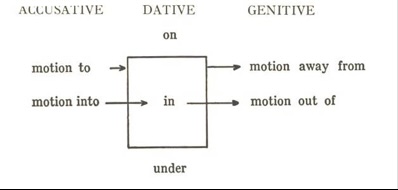13.1 Prepositions in Greek for the most part work as they do in English (S 1636 ff.). The principal difference is that the object of a Greek preposition must be inflected in either the genitive, dative, or accusative case. The preposition together with its object is called a PREPOSITIONAL PHRASE.
13.2 The original or core meaning of Greek prepositions often indicates DIRECTION. This chart shows the directions that each case generally indicates:

Three prepositions illustrate this dynamic. Note that these three have no accent.
- εἰς or ἐς + acc. into
- εἰς τὸ στόμα into the mouth
- ἐν + dat. in
- ἐν τῷ στόματι in the mouth
- ἐκ + gen. from, out of
- ἐκ τοῦ στόματος out of the mouth
- Note that ἐκ becomes ἐξ before a vowel:
- ἐξ αἵματος out of blood
13.3 Accents, Elision, and Aspiration
Prepositions – apart from εἰς, ἐν, and ἐκ – normally have an ACUTE accent. If the preposition has two syllables, the acute usually falls on the ULTIMA.
ELISION is common with prepositions; they frequently drop their final vowel before a word beginning with a vowel. In such cases, the preposition has NO ACCENT. There are two important exceptions: περί and πρό. Neither allows for elision.
After a preposition drops its final vowel, if it then ends in a STOP CONSONANT, that consonant becomes ASPIRATED if the following word begins with an aspirated vowel or diphthong.
- ἀπὸ τῆς ἐλπίδος
- from the hope
- ἀπ’ ἐλπίδος
- from hope
- ἀπὸ τοῦ αἵματος
- from the blood
- ἀφ’ αἵματος
- from blood

